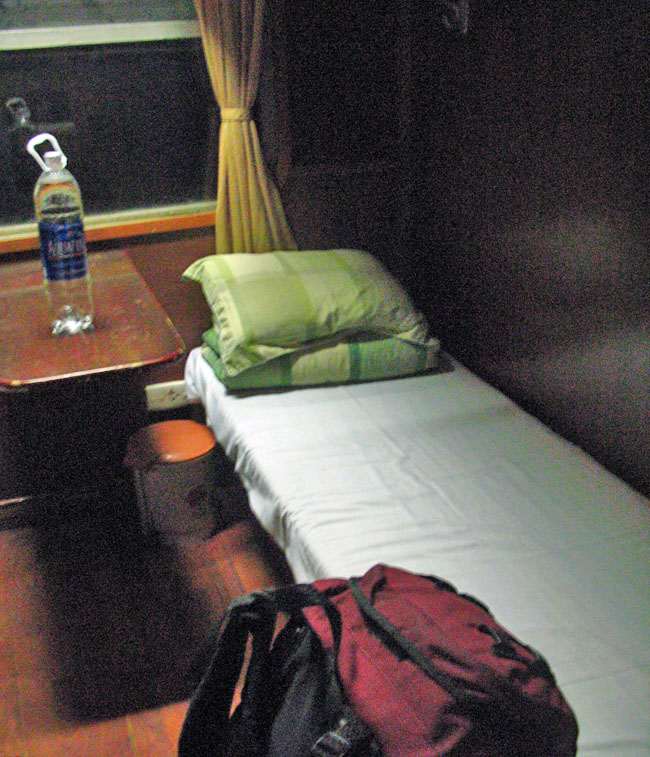 ハノイ行きの寝台列車のVIP個室 JACKIE HOFFART PHOTO この秋、時間とお金に少し余裕が出来たジャッキーは、バックパックを背負って東南アジアを回る貧乏旅行をしました。彼女がこの旅行で体験したことは — ?
You only need a few things to go backpacking: a sense of adventure, an open mind, a bit of cash and a bit of time. Oh, and a backpack.
This autumn I went backpacking in Thailand, Cambodia, Laos and Vietnam. I had never been backpacking before, mostly because I didn't have the money or time, but also because I was nervous to travel by myself. And about how I would react to what I expected to be severe poverty — the children begging, the hassle of haggling, the fear of having your things stolen.
But I decided to take a deep breath and do it anyway.
If I had to pick one experience that laid all my travel anxieties bare, it would be the stopover my Mekong River cruise made at a small village in northwestern Laos that specializes in handicrafts.
This visit was uncomfortable for a number of reasons.
First, it felt like being in a guided tour of "the natives," as if the villagers were an exhibit we walk past, point and smile at, and take pictures of. Although I was tempted to take pictures of the adorable kids, I didn't. Somehow it didn't feel right. And these kids, ostensibly poor, were playing and laughing in such a carefree way that I had to fight off the urge to imagine their lives as being some sort of utopia.
What's worse was that the entire village quickly reassembled itself to set up shop for our short visit, selling their handicrafts at quite inflated rates. To some extent these communities thrive, perhaps even survive, on the income they receive from tourists like me. I couldn't haggle with these women, not in front of their humble huts. I buckled and paid their asking price.
But by buying their handicrafts directly from them, and at rates I wouldn't have paid at the market the night before, I am complicit in reinforcing this kind of economic dependency. At the same time, how can you argue with buying something beautiful directly from the woman who made it? Why can't it just be that simple?
I think what I was really afraid of about backpacking in these regions is poverty. I was afraid of the guilt I would feel as a "rich Westerner" and how that would play out. But I was quickly reminded that poverty is contextual. My assumption of what it takes to make a person happy, to live a dignified life, might seem strange and unreasonable to these Lao villagers. It's not so simple.
But my backpacking adventure wasn't all existential conflict. Most of it, in fact, was sightseeing (many temples!), eating (amazing food!) and drinking (great regional beers!). And along the way, I developed a few basic rules for my own backpacking happiness:
First, upgrade whenever possible. It's worth paying a little more to take the VIP bus, the soft sleeper cell on the train or the room with a bathroom or a window. Even the VIP title doesn't always assure you a toilet on board, or air-conditioning that works.
Second, always carry tissues. Sanitation is basically a nightmare in Southeast Asia. The standard varies, but the rule still applies. Always carry tissues. Always. And hand sanitizer.
The third and final rule is to know that your troubles will always be with you. I was in a coastal town in southern Cambodia, staring up at the night sky — I'd never seen so many stars or felt so far away from everything I'd ever known. And yet, there with me were all of my worries and concerns: my heartaches and my dreams.
Backpacking is a kind of voyage to evade (or chase) one's own shadow, perhaps, by putting yourself in awkward or uncomfortable positions. But your shadow is always there. And solitude, sadly, is the same as it is everywhere. But I'll take solitude on a beach over solitude on the train to work any day.
Next time: What if I ... apply for film school?
|




